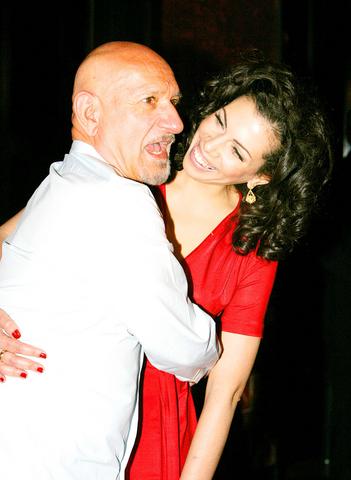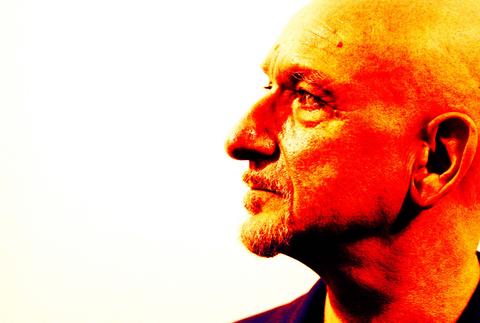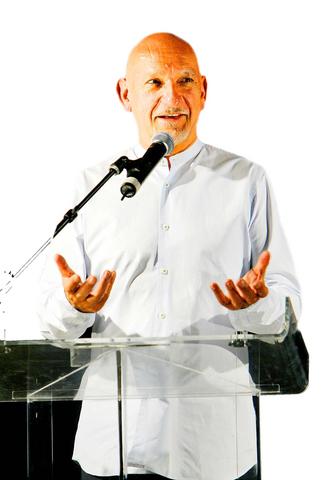Ben Kingsley, originally known as Krishna Banji, currently in the first flush of nuptial bliss with his fourth wife, Daniela Barbosa de Carneiro, will be a few moments. He's on the other side of the hotel room door finishing breakfast. While we wait in the corridor, I ask his minders how he prefers to be addressed. This is no small matter. Reportedly, he insisted that the opening credits for his 2006 film Lucky Number Slevin refer to his knighthood. He denied this. Still, on the film's poster, next to Josh Hartnett, Bruce Willis, Lucy Liu and Morgan Freeman, was somebody called Sir Ben Kingsley.
"Sir Ben," says his American press agent. "Yes, Sir Ben," says another. Should I bow? "No," says his UK-based publicist.
I can't wait to get through that door. This, after all, is the man who described the experience of playing Gandhi as being like "having a layer of skin peeled off my eyeballs." This is the man who said of his new wife: "Without sounding pompous, she looks like a combination of ancient Egypt and ancient Rome," and "Daniela is like an ancient mythological princess. She has great, deep dignity. She moves like an ocean liner." Do ocean liners have great, deep dignity? Who cares? Please, please, please let him say something as adorably bonkers to me.

Photo: AP
When the minders and I get into the suite, Kingsley isn't there. This is no good. Interviewees should be contactable by their interviewers in at least some minimal way. Then one of the suite's many interior doors opens, and Kingsley emerges sporting a V-neck top next to his chest. Oh dear. Ever since Michael Douglas wore a V-neck top next to chest in Basic Instinct, while trying to look hot and foxy for Sharon Stone and her lesbian friend at a nightclub, this has struck me as a sartorial faux pas for the older gent.
"Ah, yes. Stuart," says Kingsley, as though he has unexpectedly found a favorite, mislaid book. We settle down on vast sofas. Kingsley kindly makes sure I've got all the mineral water I need, and we begin.
I'm struck, I tell him, by the parallels between his recent marriage and the plot of one of his many new films. Elegy is an adaptation of Philip Roth's novel The Dying Animal, in which a septuagenarian cultural critic called David Kepesh discovers a sense of sexual possessiveness for a much, much younger woman (played in the film by Penelope Cruz). "Oh yes?" says Kingsley. Was he drawn to the role because there is a sense that this is an old man who has strong sexual desire in a society that regards that as a taboo or at least revolting? "It never crossed my mind. No, really it didn't."

Photo: AFP
Did he really not identify with Kepesh's predicament? After all, he is 63 and was rudely described in the Daily Mail as "bald as a coot," while his new wife is 34 and was described in the same article as "luscious." "There are parallels between the role and my life," he concedes.
But only because of "a Peter Brook quote to the effect that it's impossible to create if you are unhappy ... . I have a wonderful relationship with my wife. Unless you're really secure in your personal life, you might as well forget about it."
Lots of actors have tried. "Absolutely. I know some actors and they're going through hell, and they think they can use that baggage in their acting. They can't. The mistake that casting directors or producers often make is that if they cast actors who are antagonistic to each other in real life, that is going to work on screen. It won't.

"I was once in a film called Death and the Maiden with Sigourney Weaver, who is a good friend. And I found that the closer we got as friends, the more I was able to be antagonistic in the film in the way that my part demanded. It's all about vulnerability and trust. If you make yourself very vulnerable to a fellow actor, well, the more you do that, the more you're giving them a jewel."
Then there is a parallel between his performance as Kepesh and his relationship with his wife, which is that he has to trust his wife enough to be able to make himself vulnerable? "Well, yes. I hope I have given my wife that jewel."
To play Kepesh, he says, "What I did was to boil down the role to a couple of sentences. The sentences were: 'Once upon a time there was a man who couldn't commit. He committed, and the thing he committed to died.' If I can get it down to those two sentences and carry those sentences around with me, it leads me through the film."
Kingsley approaches most roles now with such aide-memoires in mind. "I had another one that used to make me cry and is actually quite hard for me to get through without crying now. I had the great privilege of playing Otto Frank [in the 2001 TV film Anne Frank: The Whole Story, and my story was the little girl in the playground. She is playing with her friends and it's time for the school to close, and the little girl says: 'See that man over there? That's my father.'
"And that was my role," says Kingsley, welling up. "That was my role. Make me be the best dad in the world to that little girl." By now, the tears are falling.
"It's not remotely intellectual, what I do. I make no pretence about that. So when I talk about it, it's blah blah. You know? Blah blah."
What were the two sentences he used when he played psychopathic mobster Don Logan in Sexy Beast? "Well, for me the key was that line: 'Don't you ever ever ever ever do that to me again.' He's an abused child, you see." Kingsley pauses briefly between each "ever" and escalates the volume in a crescendo of vengeful hurt - just as he did in the film. "Again, Peter Brook said you can't play a character if there isn't something in that character that you love. I loved his doggedness. He had a broad intelligence."
But is Peter Brook right? Does he really have to love something about each character? "We all have Don Logan in us and we all have Gandhi in us. We all have Myra Hindley and Mother Teresa in us." Finally Kingsley delivers the dotty remark I was hoping for.
Speak for yourself, I say. "Well," replies Kingsley, facing me down. "It depends what history pulls out of you. We all have narratives coiled inside ourselves. Actors are privileged because they can sometimes let them out."
Kingsley's two-sentence prompts must be increasingly helpful because he is working on so many, and so many varied, roles. There is, just as a practical matter, no time to approach a role in the way he did Gandhi. He prepared for the Oscar-winning role by reading all 23 volumes of the leader's collected works, taking up yoga and learning to spin cotton.
He has been working so hard that you wonder how on earth he found time to woo his new wife, still less for a wedding that involved breakfast, lunch on the lawn of their Oxfordshire home and, later, dinner at the Ivy.
In the past year alone, Kingsley has been a Russian cop hot on the trail of Woody Harrelson in Transsiberian; a Middle-Eastern oil minister whom hit man John Cusack is assigned to kill in War, Inc; an alcoholic hit man in John Dahl's forthcoming You Kill Me; a druidical shaman who can make fireballs come out of his fingers in The Last Legion; a drug-addled New York psychiatrist in The Wackness; a spiritual adviser called Guru Tugginmypudha in Mike Myers' The Love Guru; and a critic bamboozled by love in Elegy. And, oh yes, he played himself in The Sopranos.
He does more and more roles, but less and less in each, I point out. "I take that as a great compliment," Kingsley says. It was meant to be. "A great compliment." He tells me the story of the Japanese painter who hopes that by the time he's 90 he can paint a landscape with just three brush strokes. By the time Kingsley is 90, fingers crossed, he will be able to win another Oscar just by standing still and moving his eyes a little to the left.
Kingsley even worked during his honeymoon, performing as the aforementioned Guru Tugginmypudha in Vancouver. Mike Myers had cast him as a spiritual leader warning against the sins of the flesh. Let me get this right: on your honeymoon, you played a guru recommending chastity? "It does sound wrong, doesn't it?"
In Vancouver, Kingsley was feted by Indians. Such is the enduring power of Gandhi. "I enjoy an immense kindness from Indians and from the Indian diaspora. Everybody in India has seen the film at least once. When I was filming in Vancouver, I went to Little India and I was not allowed to pay for anything."
It's a surprise that Kingsley showed up for this interview at all. The Sun newspaper had a recent exclusive headlined "Gandhi is new leader of Daleks [from the popular BBC TV series Doctor Who]", reporting that Kingsley "will fit filming around his wedding in September to his third wife [actually his fourth], bit-part actress Daniela Lavender [that's not her name], 32 [or age]." Is the story true? "I've never heard about this." Still, Kingsley enjoys the mock-up picture from the Sun article I show him: a Dalek's bottom has been morphed on to the torso of Kingsley as the Mahatma. The upper half is bespectacled and giving a fey wave. Despite this visual aid, it's hard to imagine the world's foremost exponent of non-violence as the insane half-man, half-machine Dalek creator, Davros, shouting: "Exterminate! Exterminate!" Mind you, even if the story isn't true, it ought to be.
We're meeting ostensibly to talk about The Last Legion, a piece of sword-and-sandals hokum in which Kingsley dons robe, Welsh accent and ponytail to play Ambrosinus, a Celtic shaman who saves the last Roman emperor. Along with Colin Firth's enviably stout-calved Roman grunt, Kingsley whisks the little lad to Britannia, away from Peter Mullan's army of hirsute barbarians. It is hilarious, though not intentionally so. After watching the film, I visit a bookshop to find out if there is anything in Edward Gibbon's The History of the Decline and Fall of the Roman Empire, about the last emperor having a tutor who turns out to be Merlin. There isn't.
Still, there is a lovely moment in the film when Ambrosinus hurls himself on the ground near the white cliffs of Dover and kisses the hallowed sod. I ask Kingsley, who was born in Scarborough, northeast England, but whose doctor father was of Gujarati ancestry, if he is similarly attached to his homeland. "Yeah," he says, inflecting the syllable with a coy fondness. "I feel very close to Britain. I think of the Royal Shakespeare Company at Stratford, the swans and all that. The crunch of leaves on an October morning, you know?" Not really, but do go on.
"I get incredibly homesick when I'm away which I am for eight to 10 months of the year. I love England. I only have to be there for two minutes to get steeped in its identity.
"What I really miss when I'm away is English enthusiasts, which, incidentally, is something we're not very good at. We're not very good at enthusing. We're very good at lampooning and deriding. We ought to remember that the English enthusiast is a good thing."
Good point. We should enthuse more about Kinglsey rather than lampoon him. We should not report, as some journalists did, that he found out about his third wife's affair from the Internet. Or deride him for demanding to be called "sir." If indeed he did.
And, what's more, we should indulge an English enthusiast's enthusiasms. We should savor his warm-hearted dottiness. Kingsley tells me that on the set of The Last Legion he had silver dog tags made for every member of the cast and crew. He gets very enthusiastic about them. "Each had the name of their character, their name and their regiment. They all wore them with pride. I'd be wearing mine today, but I left it next to my bed at home."
His latest enthusiasm is a book. He recently bought the rights to a novel, and wants to star in a film version of it. "A couple of weeks ago you might have asked me - and if I'm putting words into your mouth then tell me to shut up - but for this article you might have asked me: 'Your canon's pretty big, is there any role you'd have liked to have played?' And if you'd asked me that, I would never have said William Shakespeare."
But then Christopher Rush sent him a manuscript copy of his new novel about Shakespeare called Will. "It came with a note: 'Please try to find a way of being Shakespeare.' So I start to read it and I think I've got to do it." Why? "It's very comparable to Rushdie. It has his rhythms and his bravura. It's a wonderful book."
But Kingsley's enthusiasm for playing Shakespeare isn't just for the novel. It's for the England he loves. "With great respect to Slovakia [where The Last Legion was filmed], I must film this in England. You know you can't simulate the crunch of autumn leaves. That early morning crunch, you know?" Again, I don't, but do go on. "That bit of mist. It's a visceral thing." His eyes, not for the first time, are moist.
The minders return to the hotel suite, insisting that the interview ends. One last question, then. How should I address him? "Ben. Just Ben." We stand and shake hands. But everybody else says it's Sir Ben? "Ignore them. It's all blah blah, you know? Blah blah."

In the next few months tough decisions will need to be made by the Taiwan People’s Party (TPP) and their pan-blue allies in the Chinese Nationalist Party (KMT). It will reveal just how real their alliance is with actual power at stake. Party founder Ko Wen-je (柯文哲) faced these tough questions, which we explored in part one of this series, “Ko Wen-je, the KMT’s prickly ally,” (Aug. 16, page 12). Ko was open to cooperation, but on his terms. He openly fretted about being “swallowed up” by the KMT, and was keenly aware of the experience of the People’s First Party

Aug. 25 to Aug. 31 Although Mr. Lin (林) had been married to his Japanese wife for a decade, their union was never legally recognized — and even their daughter was officially deemed illegitimate. During the first half of Japanese rule in Taiwan, only marriages between Japanese men and Taiwanese women were valid, unless the Taiwanese husband formally joined a Japanese household. In 1920, Lin took his frustrations directly to the Ministry of Home Affairs: “Since Japan took possession of Taiwan, we have obeyed the government’s directives and committed ourselves to breaking old Qing-era customs. Yet ... our marriages remain unrecognized,

Not long into Mistress Dispeller, a quietly jaw-dropping new documentary from director Elizabeth Lo, the film’s eponymous character lays out her thesis for ridding marriages of troublesome extra lovers. “When someone becomes a mistress,” she says, “it’s because they feel they don’t deserve complete love. She’s the one who needs our help the most.” Wang Zhenxi, a mistress dispeller based in north-central China’s Henan province, is one of a growing number of self-styled professionals who earn a living by intervening in people’s marriages — to “dispel” them of intruders. “I was looking for a love story set in China,” says Lo,

During the Metal Ages, prior to the arrival of the Dutch and Chinese, a great shift took place in indigenous material culture. Glass and agate beads, introduced after 400BC, completely replaced Taiwanese nephrite (jade) as the ornamental materials of choice, anthropologist Liu Jiun-Yu (劉俊昱) of the University of Washington wrote in a 2023 article. He added of the island’s modern indigenous peoples: “They are the descendants of prehistoric Formosans but have no nephrite-using cultures.” Moderns squint at that dynamic era of trade and cultural change through the mutually supporting lenses of later settler-colonialism and imperial power, which treated the indigenous as